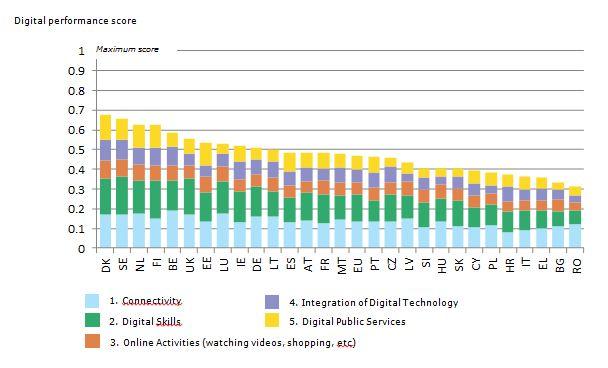There are plenty of digital opportunities waiting to be unlocked to benefit European citizens and companies. From shopping or studying online, to paying bills or using public services over the Internet – the Web is the answer, if the right conditions are in place. This is the conclusion of a new Digital Economy and Society Index developed by the European Commission and released today. Data shows that the picture of how digital countries are varies across the EU and that borders remain an obstacle to a fully-fledged Digital Single Market – one of the top priorities of the Juncker Commission.
The new tool presented today gives snapshots, per country, of connectivity (how widespread, fast and affordable broadband is), Internet skills, the use of online activities from news to shopping, how key digital technologies (e-invoices, cloud services, e-commerce, etc) and digital public services such as e-government and e-health are developed. The data is mostly from 2013 and 2014 and gives an overview of how digital Europe is, including rankings of the top digital performers.
These are the main findings of the Digital Economy and Society Index:
- Digital experience depends on the country you are in – as performance varies from digital top players such as Denmark (0.68 digital performance score out of 1) to lower-performance countries such as Romania (0.31 digital performance score). Detailed information can be found in the country sheets.

- A majority of Europeans use the Internet on a regular basis: 75% in 2014 (72% in 2013), ranging from 93% in Luxembourg to 48% in Romania.
- Europeans are eager to access audiovisual content online: 49% of Europeans who go online have played or downloaded games, images, films or music. 39% of households that have a TV watch video on demand.
- Small and medium sized businesses (SMEs) face barriers with e-commerce: only 15% of SMEs sell online - and of that 15%, fewer than half do so across borders.
- Digital public services are an everyday reality in some countries but almost non-existent in others: 33% of European Internet users have used online forms to send information to public authorities, ranging from 69% in Denmark to 6% in Romania. 26% of general practitioners in Europe use e-prescriptions to transfer prescriptions to pharmacists over the Internet, but this varies from 100% in Estonia to 0% in Malta.
Andrus Ansip, Vice-President for the Digital Single Market, said: "These figures show Europe is going digital, and Europeans enjoying great new services. The vast majority of Europeans are going online: citizens want to access online content, we need to make it easier for them. A Digital Single Market can give them wider access, help businesses innovate and grow, and boost trust in online services like e-government or banking. The European Commission will help make it happen."
Günther H. Oettinger, Commissioner for the Digital Economy and Society, said: "The Digital Index shows how radically people have changed the way they watch films: they still follow their favourite series on TV but a considerable number - 40% - watches also video on demand and films online. We need to adapt to citizens' needs and we have to think about adapting our policy."
The Digital Index is particularly relevant as the European Commission prepares its Digital Single Market strategy, to be unveiled in May. The strategy aims to create the right conditions for European citizens and companies to make better use of the great opportunities of digital technology across borders. By creating a Digital Single Market, Europe can generate up to €250 billion in additional growth, and hundreds of thousands of new jobs, in the next five years.
Background
The Digital Economy and Society Index (DESI) is presented today at the Digital4EU forum in Brussels (speech of Vice-President Ansip @Ansip_EU – speech of Commissioner Oettinger @GOettingerEU (afternoon) – audiovisual coverage will be available).
The Index combines more than 30 indicators and uses a weighting system to rank each country based on its digital performance. It is the analytical tool providing the raw material for the rollout of the Digital Single Market strategy.
To calculate a country's overall score, each set and subset of indicators were given a specific weighting by European Commission experts. Connectivity and digital skills ('human capital'), considered as foundations of the digital economy and society, each contribute 25% to the total score (maximum digital performance score is 1). Integration of digital technology accounts for 20%, since the use of ICT by the business sector is one of the most important drivers of growth. Finally, online activities ('use of Internet') and digital public services each contribute 15%. The DESI online tool is flexible and allows users to experiment with different weightings for each indicator and see how this impacts overall rankings.
The new data included in today’s DESI will contribute to the Digital Agenda Scoreboard, which the European Commission publishes annually to assess how countries are progressing towards the targets set in the Digital Agenda for Europe. The next Digital Agenda Scoreboard report is expected in summer 2015.










